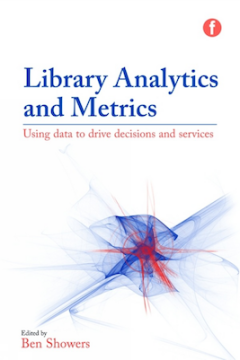
Additional Information
Book Details
Abstract
This book will inform and inspire librarians, archivists, curators and technologists to make better use of data to help inform decision-making, the development of new services and the improvement of the user experience.
With the wealth of data available to library and cultural heritage institutions, analytics are the key to understanding their users and improving the systems and services they offer. Using case studies to provide real-life examples of current developments and services, and packed full of practical advice and guidance for libraries looking to realize the value of their data, this will be an essential guide for librarians and information professionals.
Library Analytics and Metrics brings together a group of internationally recognized experts to explore some of the key issues in the exploitation of data analytics and metrics in the library and cultural heritage sectors, including:
• The role of data in helping inform collections management and strategy
• Approaches to collecting, analyzing and utilizing data
• Using analytics to develop new services and improve the user experience
• Using ethnographic methodologies to better understand user behaviours
• The opportunities of library data as ‘big data’
• The role of ‘small data’ in delivering meaningful interventions for users
• Practical advice on managing the risks and ethics of data analytics
• How analytics can help uncover new types of impact and value for institutions and organizations.
This book will be an invaluable resource for librarians and library directors interested in developing a data-driven approach to their service provision and decision making; students on library and information science courses; and managers and practitioners in other cultural heritage sectors such as museums, archives and galleries.
This book will inform and inspire librarians, archivists, curators and technologists to make better use of data to help inform decision-making, the development of new services and the improvement of the user experience.
With the wealth of data available to library and cultural heritage institutions, analytics are the key to understanding their users and improving the systems and services they offer. Using case studies to provide real-life examples of current developments and services, and packed full of practical advice and guidance for libraries looking to realize the value of their data, this will be an essential guide for librarians and information professionals.
Library Analytics and Metrics brings together a group of internationally recognized experts to explore some of the key issues in the exploitation of data analytics and metrics in the library and cultural heritage sectors, including:
- The role of data in helping inform collections management and strategy
- Approaches to collecting, analyzing and utilizing data
- Using analytics to develop new services and improve the user experience
- Using ethnographic methodologies to better understand user behaviours
- The opportunities of library data as ‘big data’
- The role of ‘small data’ in delivering meaningful interventions for users
- Practical advice on managing the risks and ethics of data analytics
- How analytics can help uncover new types of impact and value for institutions and organizations.
Library Analytics and Metrics is an excellent introduction to library analytics. It provides scope and context for emerging trends in the field and backs this up with case studies contributed by information professionals currently undertaking projects in libraries or cultural institutions in the US and UK.
Emily Sanford
Michigan State University Libraries
Library Resources & Technical Services
...a great, varied and in-depth look at the current usage of analytics and metrics in the library sector and there are some valuable case studies captured that will hopefully help inform those undertaking their own data-driven projects or facing pressure to provide impact or usage evidence to their organisations.
MmIT Journal
In this collection of theory and best practices, Showers gathers international experts on library analytics and metrics to inform information professionals of the myriad ways in which data can drive good decision making and enhance services. Each chapter provides an overview of some of the main themes surrounding analytics and the development of metrics such as big (and small) data, collection management, social media metrics, and demonstrating library impact and value. At the core of each section are real-life examples of data-driven decisions based on current library scenarios. This approach sets the text apart from other publications on the subject, and readers will be aided by the practical advice. VERDICT Relevant to library directors and administrators of cultural heritage institutions looking to create a data-driven approach to decision making and the development of services. A valuable resource for anyone who serves as a liason to faculty and students along with those who manage library systems and services.
Library Journal
In addition to Showers' brief yet thorough introduction to the topic and his concise chapter summaries, a strength of this book is the methodologies and lessons the reader learns from the case studies.
Library & Information Science Research
Ben Showers is a Digital Transformation Manager at the Cabinet Office. Previously Ben worked at Jisc where he was Head of Scholarly and Library Futures working on projects that included a shared library analytics service, as well as projects exploring the future of library systems, digital libraries, usability and digitization.
I would heartily recommend the book to all professional librarians, but also to educators, as it provides good examples not only of data usage, but also of critical thinking.
Information Research
